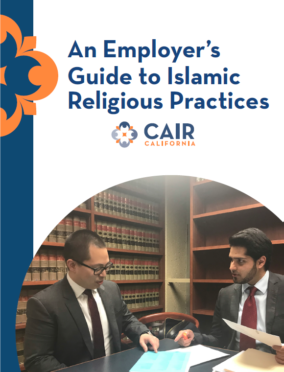Islamic practices are, in legal terminology, bonafide religious beliefs, and those who practice them regard them as compulsory religious duties. Observances such as prayer, fasting, pilgrimage, and religious celebrations are long-held practices of members of the Islamic faith. Such expressions are protected by the following provisions in the Bill of Rights and federal law.
- The First Amendment to the Constitution of the United States, which protects the free exercise of religion.
- Title VII of the 1964 Civil Rights Act, which provides that an employer may not discriminate against a person because he/she adheres to a particular faith, and that employers must accommodate an employee’s religious practices unless doing so would cause undue hardship to the employer.
Moreover, there are many state laws that contain similar provisions protecting religious rights. In the private sector, a growing number of corporations are modifying their rules and procedures to show sensitivity to the increasing number of Muslim employees and customers.
Read Publication
